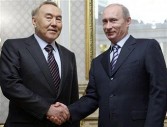 Vladimir Putin has outlined a grand vision to create a Eurasian Union of former Soviet states to compete with the European Union and China.
Vladimir Putin has outlined a grand vision to create a Eurasian Union of former Soviet states to compete with the European Union and China.
But what does this mean for oil-rich Kazakhstan, the sprawling country on Russia's southern flank?
Russia, Kazakhstan and Belarus formed a customs union last year and plan to merge into a single economic space in January 2012. Putin's Eurasian Union envisions an even deeper level of integration that is likely to shape Kremlin policy in the region if, as is expected, he reclaims the presidency at elections next March.
"We are proposing a model of a powerful, supranational association capable of becoming one of the poles of the modern world ...to play an effective bridge role between Europe and the dynamic Asia-Pacific region," Putin told the Russian daily Izvestiya in an interview titled "A new integration project for Eurasia – the future is being born today."
At one level the idea of Eurasian Union will appeal to Nursultan Nazarbayev, Kazakhstan's president, who only reluctantly agreed to the dissolution of the USSR in 1991 and has long advocated greater cooperation between former Soviet states. But the 71-year old former communist party boss has also taken care to ensure Kazakhstan's independence by balancing the nation's interests between Russia, China and the west.
Kazakhstan's agreement to join the Moscow-led Customs Union in 2009 was an extension of the balancing act – helping allay Russian concern about China's growing influence in central Asia's biggest economy.
But the Customs Union also makes economic sense, providing Kazakhstan, a country with a 16m population, with access to a market ten times as large. Officials in Astana hope that foreign investors who have so far focused on Kazakhstan's natural resources, will now take a greater interest in manufacturing ventures to diversify the economy away from oil and gas.
However, economists say that won't happen unless the government takes long overdue steps to improve the investment climate.
That means tackling corruption and reforming the judiciary to guarantee investors impartial treatment before the law, says Oraz Jandosov, a former deputy governor of the Kazakh Central Bank who now heads Rakurs, an independent economic think tank in Almaty.
Kazakh opposition leaders complain that the Customs Union has unleashed a flood of mainly Russian goods into Kazakhstan driving up prices and discouraging the development of a local manufacturing base. "Russian companies and small business enterprises are stronger than ours. Kazakhstan cannot compete," says Bolat Abilov, the co-chairman of the Social Democratic party Azat.
Meanwhile, Russian motorists have swarmed into northern Kazakhstan to take advantage of relatively low fuel prices which is contributing to an acute shortage of petrol in the country.
"It was a mistake to hurry into the Customs Union," says Abilov. "Russia dictated the terms and Nazarbayev did not protect Kazakhstan's interests."
In the Izvestiya interview Putin said the Eurasian Union would not aim to recreate the Soviet Union, adding that "close integration based on new political and economic values was the imperative of our time."
Abilov is not convinced. "In 2017 it will be the one hundredth anniversary of the Russian Revolution," he says. "We think that there is a very dangerous risk of another political union between Russia and Kazakhstan."
Sergey Aleksashenko, a former deputy head of Russia's Central Bank, says the Eurasian Union has potential to become a serious economic organisation, but it's premature to talk about political unification between Russia, Belarus and Kazakhstan.
For that to happen the leaders of the two smaller countries "would have to wave good bye to power," he told the independent Russian radio station Eko Moskvy.
For Nazarbayev, who has ruled Kazakhstan with a tight grip for more than two decades, that would probably be too much to ask.




